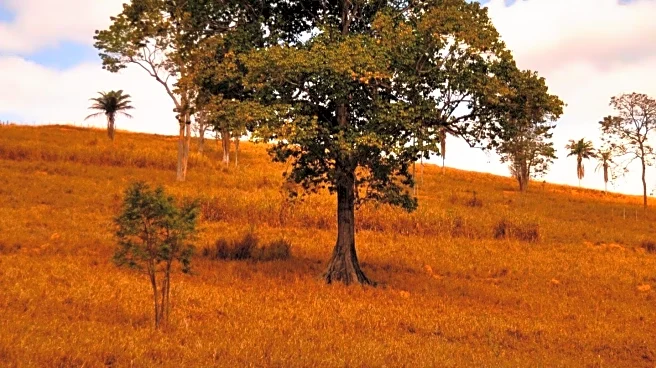What's Happening?
A study has examined the impact of Brazil's agricultural expansion on biodiversity and climate change, highlighting the trade-offs between economic growth and environmental conservation. Brazil's agricultural sector has grown significantly, becoming a major
global exporter of soybeans, beef, coffee, and sugar. This expansion has led to the conversion of natural vegetation into agricultural land, affecting biodiversity hotspots and carbon storage areas. The study explores two scenarios: SSP3, which predicts further agricultural expansion due to rising food demand, and SSP1, which anticipates land restoration due to declining food demand. The SSP3 scenario could result in significant CO2 emissions and habitat loss for numerous species, while SSP1 offers potential environmental benefits through land restoration.
Why It's Important?
Brazil's land-use decisions have global implications for biodiversity conservation and climate change mitigation. The conversion of natural habitats into agricultural land threatens species and releases substantial amounts of CO2, contributing to climate change. The study suggests that strategic reforestation could be a cost-effective way to enhance carbon sequestration and protect biodiversity. These findings emphasize the need for sustainable land-use policies that balance agricultural productivity with environmental preservation.
What's Next?
Brazil may need to implement policies that prioritize the protection of carbon- and biodiversity-rich areas while promoting sustainable agricultural practices. International cooperation and investment in reforestation initiatives could support Brazil's efforts to mitigate climate change and preserve its unique ecosystems. The study's insights could inform global discussions on sustainable land management and climate action.
Beyond the Headlines
The study highlights the interconnectedness of agriculture, biodiversity, and climate change, underscoring the importance of integrated approaches to land-use planning. Brazil's experience could serve as a model for other countries facing similar challenges in balancing economic growth with environmental sustainability.















